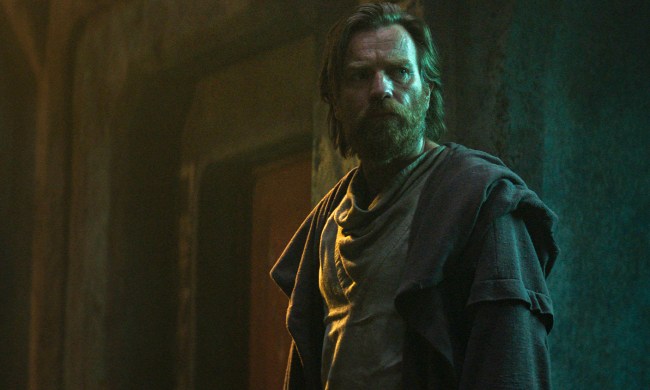Outside of a sequel trilogy, a solo Obi-Wan Kenobi movie or TV series has arguably been the most in-demand Star Wars project among fans. Especially given the timing, the very concept seems like a slam dunk for Lucasfilm, as Ewan McGregor’s turn as the titular Jedi Master was perhaps the best thing to come out of the prequel trilogy and the actor is at the perfect age to take on such an endeavor. The vague premise and concept practically write themselves and, after years of speculation and outright lies from the star himself, Obi-Wan Kenobi is finally a go at Disney+ in a limited series format — and it premieres in just about two months from now.
Series director Deborah Chow and writer Joby Harold have quite the task on their hands, but the long-awaited trailer for the show is dripping with promise. Chow, in particular, has already tested her mettle on the acclaimed The Mandalorian, so veteran Star Wars fans should be hopeful of the final product. Though the concept of Obi-Wan Kenobi is clear as day on paper, there are certain boxes to tick and hurdles to jump to help ensure the series measures up to the Jedi’s storied legacy in the Star Wars universe and in pop culture. Here’s what we’d like to see from the Obi-Wan Kenobi series.
1. A story unconcerned with excessive fan service

Something that can, unfortunately, be said for some Star Wars and Marvel TV shows on Disney+ is that they focus too much on fan service that is detrimental to its storytelling. The Mandalorian has been off to a roaring start in these first two seasons, but the second season started to signal Lucasfilm getting too greedy with the Marvel Cinematic Universe formula. A consistent problem with several of the MCU shows has been concerning themselves too much with cameos and in-universe advertisements for future projects, and that issue aggressively bled into Star Wars with The Book of Boba Fett.
The titular bounty hunter ended up taking a back seat in large parts of his show, with a plot that focused more on fan service than the story at hand. Obi-Wan Kenobi shouldn’t suffer from this issue, as the draw of its lead is gargantuan and this is more of an isolated event series rather than part of the mini cinematic universe. Nonetheless, fan service will always be something that needs to be approached with care and moderation in massive IPs like this.
2. Exploration of the galaxy outside of Tatooine
A new Star Wars movie or show going through the sand planet of Tatooine has grown to incite collective fandom groans rather than nostalgia at this point. It’s the equivalent of the Pokémon franchise constantly pushing Charizard and Pikachu in new games, anime, etc., and Lucasfilm has shown that it truly can’t seem to help itself considering the sequels’ Jakku is merely Tatooine 2.0.

Thankfully, the Obi-Wan Kenobi trailer has already been soothing those fears, as it’s been confirmed he’ll explore the new planet of Daiyu. It’s been said this locale will take inspiration from the neon-lit nightlife of Hong Kong, which is certainly encouraging from a visual standpoint. The show will ideally balance the new (or at least different) locations with Tatooine, as Obi-Wan’s purpose is inherently tied to the planet due to being tasked as Luke Skywalker’s watchful guardian.
3. The ongoing threat of the Inquisitorius
Giving the great Obi-Wan a threat that measures up to his skill and wisdom is canonically a tall order. Aside from being a bona fide Jedi Master, he’s debatably the kind of Master all others in the Council should strive to be — Yoda included. The Order was stuck with puritanical beliefs that demanded emotional repression of its members, effectively having a hand in creating Darth Vader. That’s why the most imposing and ongoing threat that Obi-Wan can face in this series is a combination of the Empire’s Inquisitorius and the context of the time.
Forcing the Jedi into hiding and on the run is the perfect handicap to make the stakes of a prequel show feel real. Each of the Inquisitors is lethal in their own right, but is comfortably out of their league when it comes to Kenobi himself. He has to hide his prowess in the Force and avoid showing his lightsaber in public. The trailer looks like this will be tackled well in the series, with the Imperial lapdogs trying to exploit the Jedi Master’s compassion and empathy to snuff him out. And what’s compelling about this as a plot device is that it’s both a physical conflict, as well as a (surely) fascinating conflict of morals.
4. Tasteful use of flashbacks to Obi-Wan and Anakin’s Clone Wars days
While fan service can easily become a detriment to a show, game, book, or movie, it’s been known since 2020’s Disney Investor Day stream that Obi-Wan Kenobi would bring back not only Darth Vader, but prequel trilogy actor Hayden Christensen as well. Luckily, the narrative can easily justify Anakin being here for reasons aside from merely appeasing longtime fans with an Easter egg.

Star Wars: Episode III — Revenge of the Sith highlighted it best, as McGregor’s Obi-Wan and Christensen’s Anakin had a tragic brotherly bond that would strike a powerful chord with the characters 10 years after the fall of the Republic — and for the fans watching 17 years since the release of RotS. It would certainly need to be handled by deft hands, but concise flashbacks to the Master and the Apprentice’s days during the Clone Wars could be exceptional to punctuate the tragedy happening with Kenobi emotionally in the present.
5. A Kenobi vs. Vader rematch that’s both spectacle and emotional
When homing in more on Obi-Wan and Anakin’s relationship, one even more specific, but no less spectacular, selling point of the upcoming Disney+ series is the “rematch of the century.” It’s been touted as such since the synopsis given at the Investor Day stream and, naturally, has a lot of expectation riding on it. A rematch on a scale like this has all of the moving pieces necessary to make this climax feel powerful and sincere, but also runs the risk of feeling cheap and unnatural if fumbled.

Darth Vader’s ominous and unmistakable breathing heard at the end of the Obi-Wan Kenobi teaser trailer shows that Lucasfilm knows where to tug at fans’ hearts, and while the thought of this fight falling short is frightening, it also has incredible potential. Given the characters’ aforementioned rich, beautiful, and heartwrenching history, a fight between these two needs to be equal parts explosive spectacle and profoundly emotional. All the substance is there, and it will be exciting to see what Chow and Harold have in store.
Obi-Wan Kenobi premieres on Disney+ May 25.



